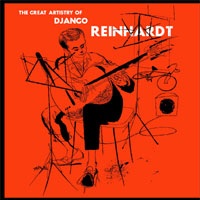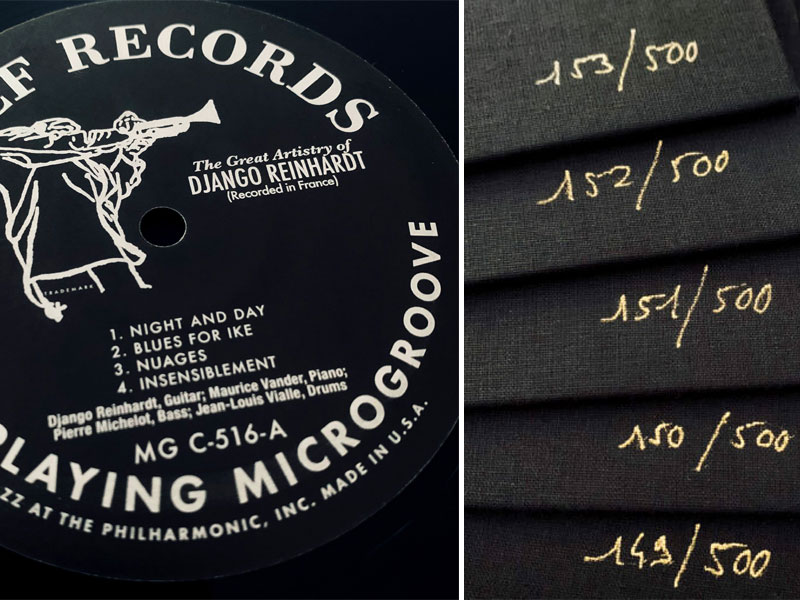Django Reinhardt • The Great Artistry of Django Reinhardt
There is still a single record label for which I maintain a complete run: Sam Records, a one-man, non-profit operation based in Paris and run by Fred Thomas since 2011. His stated mission is to reissue jazz recorded and produced in France during the 1950s and 1960s. His love of jazz and photography, combined with a sense of fanatical attention to detail, led him to use master tapes for the music and original photography for the artwork of his covers. After 13 years, he is approaching almost three dozen titles released, and the perfection of the mastering, pressing and packaging make each LP an art object. As if to amplify the marriage of art and science, Thomas occasionally releases a title in his Artisan series that is literally a work of art -- the covers of these limited-edition reissues are manually screen printed. Each is only available direct from Sam Records. The first release in the series was a Donald Byrd release limited to 300 copies. The second, a Billy Harper Quintet release, was limited to 200 copies and sold out instantly. Artisan 3 and 4 were from Big Bill Broonzy, limited to 450 copies each. The 500 copies of this Django Reinhardt title may be gone by the time you read this review. The Great Artistry of Django Reinhardt was recorded in Paris in 1953 and released the same year as a 10” LP in the US [Clef MGC-516] and France [Blue Star 6830]. It was reissued several times until 1963, and after that only on CD. The Sam Records reissue replicates the Clef cover, so it does not have the European flip-back jacket style of most of the Sam Records releases. The cover illustration by David Stone Martin was manually screen-printed by Stéphane Constant. A four-page insert contains the original liner notes by Norman Granz (founder of Clef and Verve), an essay by Alain Tercinet, and photos by Maurice Zalewski. The back cover is black with nothing but the hand-numbering of your copy. The LP is shipped in a separate sleeve. The Sam Records reissue was mastered from the original mono tapes by François Lê Xuân and the lacquers were cut at 45rpm by Kevin Gray at Cohearent Audio. It was pressed in Marciac, France, by Garcia & Co. on 12" 180-gram vinyl. Like every Sam Records release, the vinyl is dead quiet.
During his lifetime, Jean Reinhardt (1910-1953), known by his Romani (gypsy) name of Django, recorded about 900 sides, most issued on 78rpm records. The Great Artistry of Django Reinhardt is the only music he recorded for the LP format, which was introduced in 1948 and just taking off when he passed away. He was an institution in Paris and among the first major guitar players to feature that instrument as a lead in a jazz ensemble. He fused gypsy music with jazz into what became labeled “gypsy jazz.” Through much of his career he played acoustic guitar, usually a Selmer, a small brand that became synonymous with him. Late in his career, he began trying out the electric guitar, and that is what he plays on this date. The session came about after Reinhardt agreed with Norman Granz to go on a US tour with Granz’s Jazz at the Philharmonic, and Granz suggested recording an album to promote him. He assembled his favorite sidemen -- Maurice Vander on piano, Pierre Michelot on bass and Jean-Louis Viale on drums -- and recorded eight sides in a Paris studio on March 10, 1953, during a three-hour session. For the music, Granz and Reinhardt agreed on four American standards, a French standard and three original compositions. The playing is classic Django Reinhardt, incorporating ever more bop conventions but displaying his trademark fast runs and bright tone. Despite the switch to electric guitar, his trademark sustain and vibrato are immediately recognizable. As good as Django Reinhardt recordings sound (especially the 78rpm transcriptions in the Jazz Stars Series released in France on La Voix De Son Maître and in Great Britain and the US on EMI), the sound of this LP is far superior. Its only weakness is the recording of the sidemen, which lacks the definition in space and the clarity of the great mono recordings made by Blue Note later in the decade. But the sound of Reinhardt's guitar is simply amazing. You are right there with him, the sustain of his tone so clear that you feel like you can reach out and touch him. Upper-frequency extension is not lacking, and the midrange is as smooth as you could hope for. I can honestly say that this LP sent chills through my body the first time I listened to it, and each subsequent play has only reinforced my impression that this is one of the best-sounding guitar recordings in my collection. Given the fact that Django Reinhardt is one of the most
influential players in jazz history, and widely acknowledged as one of the greatest guitar
players of the twentieth century, I consider the €110 price of this LP well spent. |

 ver the decades I have spent as a record collector, I
have often slipped into the role of completist, whether it be a complete run of a
particular label or every official LP issued by an artist. As my record collection
threatened to take over more than the one room, I decided that there was really no need to
support hundreds of LPs that I would never listen to again, and out they went to other
music lovers hungry to expand their own collections. As much as I love Miles, Ornette and
Trane, collecting and holding on to every one of their releases became a road too far, as
my collection moved into closet space, boxes and other crevices I was unlikely to happen
upon in my time left on this planet. Trying to complete a run of all LPs issued by a
record label is a sure sign of being unhinged, yet for many years I chased that dream with
a few favored labels.
ver the decades I have spent as a record collector, I
have often slipped into the role of completist, whether it be a complete run of a
particular label or every official LP issued by an artist. As my record collection
threatened to take over more than the one room, I decided that there was really no need to
support hundreds of LPs that I would never listen to again, and out they went to other
music lovers hungry to expand their own collections. As much as I love Miles, Ornette and
Trane, collecting and holding on to every one of their releases became a road too far, as
my collection moved into closet space, boxes and other crevices I was unlikely to happen
upon in my time left on this planet. Trying to complete a run of all LPs issued by a
record label is a sure sign of being unhinged, yet for many years I chased that dream with
a few favored labels.